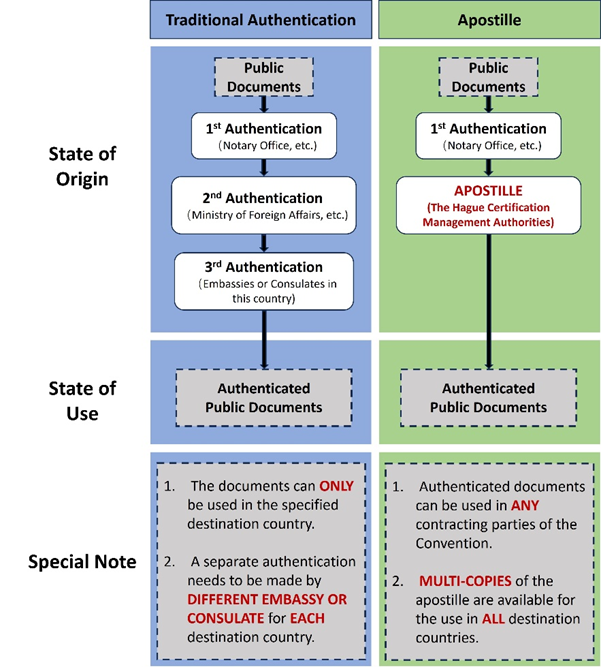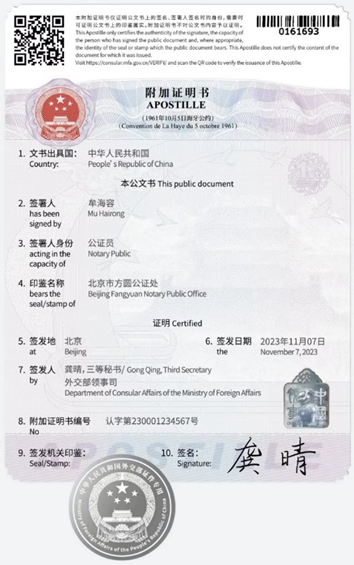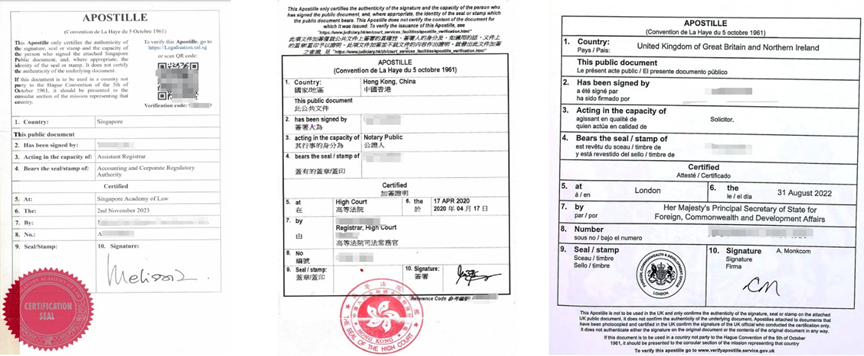You may have heard the news that China has joint the Apostille Convention on 7th November 2023. But do you know that this action will bring you significant conveniences when doing business in China? Keep reading to know more about apostille!
Introduction to Apostille
On March 8, Mr. TAN Jian, Chinese Ambassador to the Netherlands, formally submitted the instrument of accession to the Dutch Ministry of Foreign Affairs on behalf of China, the custodian of the ‘Convention on the Abolition of the Requirements for Authentication of Foreign Public Documents’ (hereinafter referred to as ‘the Convention’), marking China’s official accession to the Convention. Starting from November 7, official documents from China to other contracting states only need to apply for the additional certificate, or the apostille, instead of applying for consular legalization from the local embassies or consulates in China. At the same time, official documents will only need to go through the apostille before being sent to China from other contracting states and the consular authentication by the Chinese embassies or consulates is no longer needed.
Certification Procedure: Before vs After
Before China’s joining the Convention, the general practice of document delivery between China and other countries or regions was by the consular authentication process, which refers to the activity in which consular authentication agencies verify the authenticity of domestic foreign-related notarial deeds, other certification documents, or the last seal or signature on relevant foreign documents based on application.
Certification under this traditional model used to require "three-step certification", or even "five-step certification" when the documents were to be delivered to some specific countries. More detailly, certification of documents started with notarization by notary offices in the country of origin, followed by the certification by the Ministry of Justice or Ministry of Foreign Affairs if required. After going through the certification procedure, the documents then were transferred to the embassy or consulates of the country of destination for further processes. In some cases, the legalization Ministry of Foreign Affairs of the country where the document would be used was needed in addition to all the steps. The whole process was complex and might take at least one month or even longer, costing a great amount of energy and money. In addition, embassy or consular authentication can only be used in one country. In other words, if the documents are to be sent to different countries, a separate certification needs to be obtained for every receiving country.
After the Hague Convention comes into effect, this process will be greatly shortened. You only need to obtain the notarized document from the country of origin first, and submit it to the authorized department in the country of origin for apostille before it can be recognized by any contracting parties of the Convention. This whole process is greatly simplified compared to the traditional certification procedure and can save applicants valuable time and money.

Fig 1. Flowchart of consular authentication and apostille
Where to Get the Apostille?
While the procedure of obtaining apostille is very alike in all contracting parties of the Convention, the difference, however, lies in the competent authorities responsible for issuing apostille certification. Here Hongda lists some of the authorized departments where you can get apostille certification.
- The Chinese mainland: The Department of Consular Affairs of the Ministry of Foreign Affairs, authorized foreign affairs offices in province level, authorized notary offices in Beijing;
- Hong Kong SAR: High Court of Hong Kong;
- Macao SAR: Legal Affairs Bureau of Macao;
- The US: the Secretary of State for documents issued by US individuals and state governments; or the Department of State for documents issued by the federal government;
- The UK: Foreign, Commonwealth & Development Office of the UK;
- Singapore: The Singapore Academy of Law;
What Information is Included in Apostille?
Fig 2. Samples of apostille from Singapore (left), Chinese Hong Kong (middle), and the UK (right)
The apostille is an additional stamp on authenticated document. As we can see from the samples of apostille, although the formats of the apostille may vary depending on the design of each country or region, they all have the same fields of contents. Let’s take a look at China’s apostille as an example for more details!
 |
|
What Documents Are Subject to Apostille?
Not all documents are accepted for apostille. General you can apply for apostille for both your individual and corporate documents, and even some third-party documents. The typical documents include:
- Personal documents: marriage/divorce certificate, birth certificate, kinship certificate, death certificate, work experience certificate, power of attorney/declaration, green card/passport, invitation letter, single certificate, acknowledgment of judgment, testament, no criminal record certificate, real estate certificate, academic transcripts, diploma, professional qualification certificate, and medical certificates, etc.
- Corporate document: power of attorney, certificate of registration/business license, tax certificate, production license, free sales certificate, tax payment certificate, ISO certificate, product test report, trademark registration certificate, CE certification, import and export registration, etc.
- Third-party agency documents: government website promotional content, police station letters, customs reports, government reports, etc.
Examples: When You Might Need Apostille
Case 1: Setting up a WFOE and applying for a working permit in China.
Let’s consider that you are running your own company in your home country, and you want to expand your business to China by setting up a WFOE. Since the Administration of Industrial and Commercial in China cannot obtain detailed information about your overseas company and your identity, the notarization and certification of the overseas company need to be obtained to prove its legal status, which typically includes: (1) the business license or certificate of incorporation; (2) name list of directors and shareholders; After forming your WFOE, the application for a work permit would require the notarized documents of your degree diploma and non-criminal record. In traditional practices, the notarization of these documents can be complex and time-consuming as they need to go through the processes in both local notary offices and the Chinese embassy or consulate.
Case 2: Participating in domestic civil litigation or commercial disputes.
According to the relevant provisions of China’s Civil Procedure Law, foreign entities participating in domestic litigation should provide notarization and certification of the following contents: (1) business license of proof of business entity; (2) certificate of the authorized representative of the foreign company; (3) passport of the authorized representative; (4) the power of attorney; (5) evidence produced outside the territory.
Please carefully read the special reminders at the end of this blog for more information on how to use the apostille and some situations where the apostille may not be accepted! Or you can contact Hongda and book a free meeting for more information!
Special Remainders When Applying for Apostille!
- Although some countries listed below had formally submitted the instrument of accession by the time of publishing this blog, the Convention will not enter into force until a specific date. For Canada, the Convention will come into effect on January 11, 2024. For Rwanda, the Convention will be effective on June 5, 2024. In other words, the Convention will NOT be forceful between these two countries and any other contracting parties until the given date mentioned above.
- According to China’s reservation articles to the Convention, the Convention will NOT apply between China and any contracting parties that China does not recognize as a Sovereign state, including the Hong Kong S.A.R. and the Macao S.A.R. This means that documents between Hong Kong and Macao, and the Chinese mainland still need to be forwarded by an authorized agency.
- As India had raised objections to China’s accession to the Convention, the Convention will NOT take effect between China and India. For any document to be notarized between the Indian and Chinese governments, the traditional method of consular notarization will still need to be implemented.
Conclusion
Apostille will surely bring you great benefits while doing business in China by simplifying the authentication process across different countries and regions. For foreign-invested enterprises in China, "Apostille certification" will undoubtedly reduce the company's administrative burden. Currently, in many cases, foreign-invested enterprises are required to certify the business registration extracts or business licenses of their shareholders/investors to prove their legal existence.
Eager to know more about how the apostille can help you expand your international business or start a new business in China? Or do you want to apply for apostille for the documents to be used in an overseas country? Contact Hongda for a free consultation now! We can advise you on the best cities as your investment destination and can provide more related services to fit your needs when operating in China!






